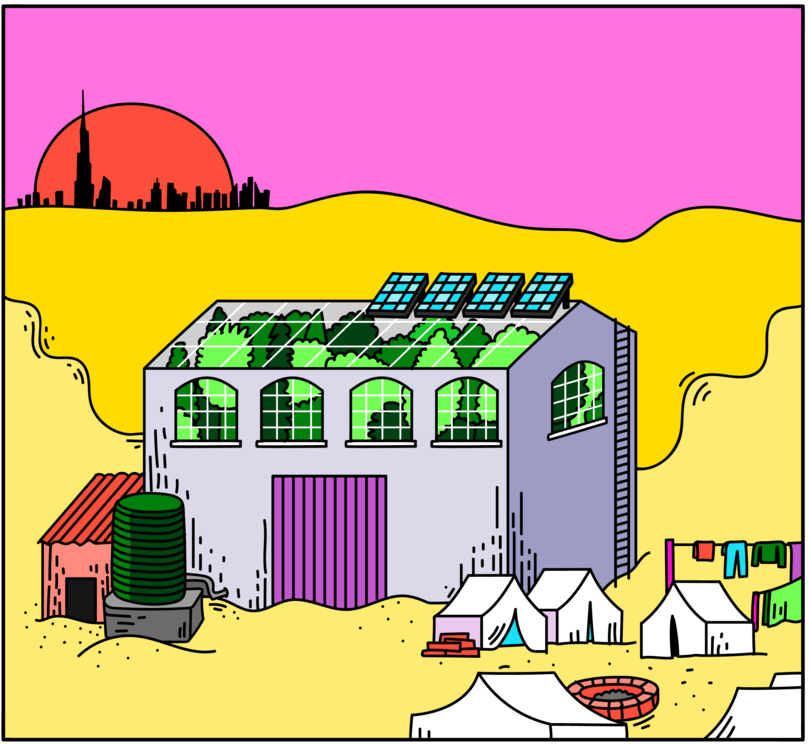The News
All the news, all the time.
3 January 2050
Press release

Exile nation: What happens when you’re forced out of paradise?
In the dark of the Qatar desert, Dr Shanaaz Naicker sits on the edge of the rickety corrugated rooftop of a former warehouse and looks out at the glowing beacon of Bezosistan, that Amazon paradise zone 50 miles away she used to call home until her unexpected retrenchment nine days ago. “I used to have a whole dang life there,” the 27-year-old bioengineer sighs. A two-bedroom apartment in the sky garden district with an enclosed balcony for her cats, Hamilton and Angelica. Her work was important and useful, developing organ-growth tech, although she can’t get into the details because of the “hectic” NDA she had to sign. She used to kayak to work along the canals, she had interesting and accomplished friends, was a regular at the local vegan deli, and she’d recently started dating an AI project manager, Emad, who declined to be interviewed for this article.
Now Shanaaz is one of the “warehoused” of Limbo City – the unemployed (and maybe unemployable), camping out among the abandoned warehouses on the edge of Bezosistan’s borders, sending off their resumes and hoping, fervently, to get back in.
It’s not the worst place you could live. Sure, the warehouse is crumbling, subject to the ravages of the desert, and seasonal infestations of camel spiders, but the community is made up of some of the brightest young rejects who have used their considerable tech skills to jerry-rig a pale simulacrum of the lives they used to have inside the paradise zone.
Shanaaz walks me through the highlights. There’s an allotment greenhouse, and a meat growlab that used to run on solar power until Qatar’s sulphur phosphate injection into the atmosphere dimmed the sky, so now the spin bikes and treadmills in the makeshift gym are hooked into the DIY power grid. There’s a shared kitchen where people cook together, a woefully under-resourced robotics lab, a small clinic, and even a sculpture park with DIY creations – welded ironwork, wind-harvesting mechanical beasts – starting to colonize the stretch of desert out the back where Shanaaz has set up her tent. She’s elected to have some privacy rather than take a bed in one of the dorm rooms. Most importantly, there is wifi, so the Limboites can send out job applications, endless job applications, almost always to Amazon and their affiliate corporate states.
The reason they don’t look further afield is that very often they can’t. Many former Amazon employees, like Shanaaz, are bound by brutal non-disclosure agreements and restraints of trade that make it almost impossible for them to emigrate to another corporate state, or at least not with their current skill set. It’s why she’s signed up for a coding course offered by one of the other residents, and why she’s, in turn, offering bioengineering 101 to her commune mates, 9 a.m. to noon weekdays. The rest of the time she works in the clinic, hoping that practical hands-on medicine will be an asset, another tick box on her resume.
We wend our way through the outdoor bazaar consisting of small local businesses, stalls selling electronics parts, and food trucks set up in shipping containers at the edge of the sculpture park. A young man in a dark suit is playing guitar on a raised stage strung with fairy lights and singing sultry lounge covers of hits through the decades. “Smells Like Teen Spirit” segues into “Old Town Road” and an acoustic version of “WAP”, occasionally interrupted by the low buzz of drones flying in, hung with packages.
We get coffee from Outer Perimeter, one of three vendors here, and the only one without trellis tables populated by people with laptops typing up cover letters and resumes or appeals to HR.
“Jamala likes people to grab their coffee and go,” Shanaaz explains.
“It’s takeaway,” the tall Congolese man says, “so you must take it away!” Jamala is a former VR programmer, who has been in exile from Bezosistan for 19 months already. He specialized in programming realistic grass that moves with the wind, “and now I make realistic coffee,” he grins. “Spoiler. It’s not coffee, it’s chicory.”
“Everyone’s got a theory about why Bezosistan doesn’t come and shut us down,” Shanaaz says. “Maybe they feel guilty for retrenching us. Or they’re keeping us on standby for when someone dies or screws up, and they want to keep us within easy reach if they want to rehire us. It doesn’t happen often, but there was this one guy.”
“Ari Lacrosse,” Jamala chimes in.
A local legend, the man who escaped, who reclaimed the dream. But the details vary depending on who you talk to: when he was here, the job he returned to, how he did it. It was three years ago or four. There are darker rumours: that he was a programmer who sabotaged his own code so ingeniously he was the only one who could debug it and they had to hire him back. Or he was a lawyer with dirt on a competitor, or an HR manager with a blackmail catalogue of buried sexual harassment cases, a physicist whose replacement mysteriously died of food poisoning. But Shanaaz waves those theories away as “melodrama and revenge fantasies”. She takes the lid off her coffee to stir, and I smell the whisky coming off it. A friendly cat swirls between her ankles. “He was good at what he did and they needed him back. You’re irreplaceable, until you’re not.”
“They can’t shut us down, in case they need us,” Jamala agrees.
But perhaps there’s another reason Limbo City is tolerated, I think as I notice another drone buzzing in overhead, the Cheshire smile of Amazon’s logo on the box. After all, they’re customers too.
It’s almost time for me to leave. I bend down to stroke the cat, scruffy in the way of the very recently neglected, like so many of the inhabitants here. “Is this one of yours?” I ask. The cat nudges its head into my hand, purring.
“No. I had to leave them behind,” Shanaaz says, sipping her spiked coffee and staring out at the bright glow on the horizon. “But I’ll be back for them. Soon. You’ll see.”



